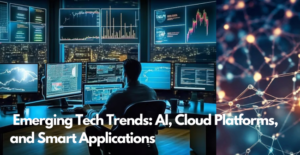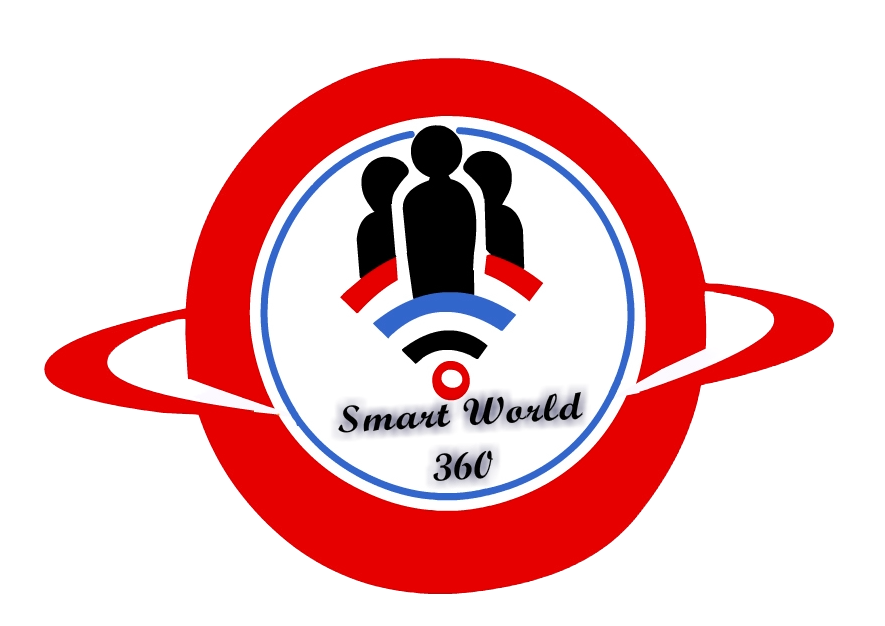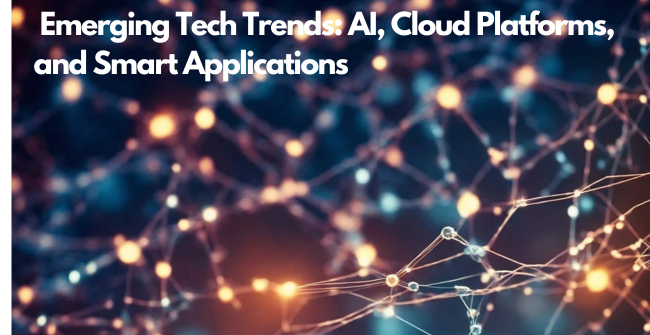Emerging Tech Trends: AI, Cloud Platforms, and Smart Applications is advancing rapidly, revolutionizing sectors and changing the way we live and work. The digital world is rapidly changing, with human augmentation improving physical and cognitive capabilities, artificial intelligence-powered development speeding up software production, and much more. Industry cloud platforms, smart applications and AI trust frameworks are helping us to a future that is more efficient, connected, and intelligently integrated. But with these advances also come challenges related to privacy, security and ethics.

Human Augmentation:
Human augmentation is enhancing human abilities through wearable exoskeleton technology and brain-computer interfaces. For instance, exoskeletons are helping individuals with mobility challenges walk again, while brain-computer interfaces allow users to control devices with their thoughts; however, concerns around accessibility and privacy remain. The market for human augmentation is expected to grow to $ 298.50 billion by 2027, driven by demand in healthcare defense and personal productivity tools.
AI Augmentated development:
AI is now revolutionizing software development by automating code generation testing and debugging. Tools like git-hub and Co-Pilot suggested code snippets in real time, significantly speeding up the development process however , developers need to remain cautious over Alliance and AI tools that could introduce security vulnerabilities as companies push for faster software delivery. AI-augmented development is becoming essential for maintaining compatibility.
Industry cloud platforms:
Industry cloud platforms offer tailored solutions for specific industries such as health care, finance, and manufacturing. These platforms provide specialized tools to meet regulatory compliance requirements while boosting operational efficiency. For example, healthcare cloud platforms streamline patient data management and support care coordination. However, the challenge lies in ensuring data security and interoperability between platforms. The market for industry cloud platform is expected to reach $83 billion by 2025.
Smart Apps:
Smart apps leverage AI machine learning to provide personalized user experiences and automate tasks. These apps are being used across sectors like finance, health care, and Retail to improve customer engagement and operational efficiency. For example, smart investment apps offer tailored financial advice, while healthcare apps assist in diagnostics; however, data privacy remains a concern as these apps collect sensitive user information. The market for smart apps is projected to grow to $62.4 billion by 2025.
Democratized generative AI:
Generative AI, which create new content like text images or music is becoming more accessiable this trend is enabling business and individuals to leverage powerfull AI tools without needing deep technical expertise tools like Dolly are already transforming market entertainment and design however as generative AI become democratized concern about copyright infrigment and misuse of content are rising.
Continuous threads exposure countermeasure CTE:
CTE tools enable organization to continuously monitor and address vulneriable in real time this proactive approach helps business stay ahead of cyber threats and comply with security standerds while CTE system are improving cyber security managing them can be resource intensive sectors like finance healthcare and government are adapting these tools to protect sensitive data.
AI Trust, Risk, and security management :
Ai trism framework focus on bulding ethical and transparent AI systems by addressing risks related to bais privacy and account accountability in industry like healthcare AI trism ensures that algorithm provide fair and accurate diagnosis while in finance it helps prevent discriminatory practices however achiving full transparency in complex AI system remains a challenge as AI adption growth AI trism framework become criticlal for mintaing trust.
Platform engenering :
Platform engeenering integrate cloud infrastructure develops tools and devlpment platforms to streamline to software delivery process this approach allows business to scal operation efficiently and deploy application faster however implementing platform engering solutions require significant investment in infrastructure and expertise as business prioritize agility the scalability the demand for platform engenring tools is expected to rise.
Machine customers :
Machine customers are AI system that can make autonomous purchasing decision on behalf in businesses or individuals. These systems analyze data, predict needs, and place orders without human intervention. For example, AI-powered chatbots can reorder supplies for a company when stock runs low. While this tech and trend improves efficiency, it raises concerns about control and accountability over automated processes. As companies explore this concept further, B2B and b2c transactions will increasingly rely on machine customers.

Augmented connected workforce :
The Augmented connected workforce leverages remote collaboration tools, AI insights, and wearable devices to enhance productivity. This trend is especially relevant in the era of hybrid work models, where teams need to collaborate from different locations. Tools like Zoom and Microsoft Teams have become essential for communication while wearable tech monitors worker health and safety However, companies must balance employee privacy with performance tracking to avoid ethical concerns. The workforce management tools in the market is forecasted to grow to $9.3 billion by 2026.
Here are some other pros and cons to the broad trends discussed in your article:
Pros:
Augmented Humans – Augmentative technologies such as exoskeletons and brain-computer interfaces are improving mobility and accessibility for people with disabilities.
Higher Efficiency & Productivity – AI-assisted development, intelligent applications, and industry cloud platforms optimize operations, minimizing manual tasks and increasing productivity.
Enhanced Cybersecurity – CTE (Continuous Threat exposure) tools offer real-time tracking and monitoring for protecting systems against cyber threats, securing data.
Cons:
Privacy & Ethical Concerns – AI and smart apps inherit lots of data from users, resulting in security issues of this data and wrong uses of these that do not agree with user’s preferences.
Bias & Transparency Issues – AI-based decisions might carry certain biases that make fairness and accountability harder to establish.
High implementation costs– New technologies such as platform engineering and AI trust frameworks, typically require substantial investment in the supporting infrastructure for implementation.
Conclusion:
However, as businesses and individuals adopt these new, innovative technologies, a balance between innovation and responsibility must be struck. AI-powered solutions, cybersecurity innovations, and intelligent automation promise to reshape industries, however, questions related to data privacy, regulatory compliance, and ethical AI need to be tackled. With the technology constantly evolving, it is promising for the future and it will always lead organizations with changes in technology.

